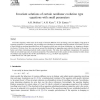Free Online Productivity Tools
i2Speak
i2Symbol
i2OCR
iTex2Img
iWeb2Print
iWeb2Shot
i2Type
iPdf2Split
iPdf2Merge
i2Bopomofo
i2Arabic
i2Style
i2Image
i2PDF
iLatex2Rtf
Sci2ools
116
click to vote
AMC
2006
2006
Invariant solutions of certain nonlinear evolution type equations with small parameters
The Fisher equation, which arises in the study of reaction diffusion waves in biology, does not display a high level of symmetry properties. Consequently, only travelling wave solutions are obtainable using the method of invariants. This has a direct bearing on studying perturbed forms of the equation which may arise from considering, e.g., damping or dissipative factors. We show, here, how one can get around this limitation by appending some unknown function to the perturbation and obtain interesting practical results using invariants. The ideas have significant consequences for equations which do not admit large class of symmetry properties. The method used in this analysis is then extended to other classes of evolution type equations that involve perturbations, for, e.g., the KdV type equations.
| Added | 10 Dec 2010 |
| Updated | 10 Dec 2010 |
| Type | Journal |
| Year | 2006 |
| Where | AMC |
| Authors | Ashfaque H. Bokhari, Abdul Hamid Kara, F. D. Zaman |
Comments (0)

